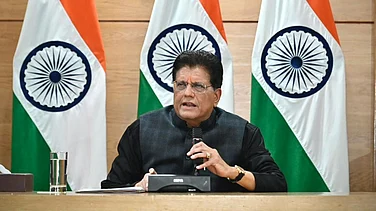India on Monday asked the International Maritime Organisation (IMO) to focus on a realistic target to ensure that net zero carbon fuels occupy 5 per cent of the Marine fuel mix by 2030, without any additional checkpoints during this explorative and take-off period.
During the plenary of the 80th session of the Maritime Environmental Protection Committee of the IMO here, Indian delegate Ajithkumar Sukumaran, Chief Surveyor-Cum-Additional DG, Ministry of Shipping, said, "any unrealistic target will place undue pressure on the governments to resort to flawed policies, industry to make haste and unsustainable investments, and the research to push through half-cooked and immature technological solutions - all of them will have long term, irreparable repercussions on this industry."
That is why India, which falls under the extremely risky category in the climate change vulnerability index, had submitted an MEPC document, proposing a way forward for the reduction strategy to be phased in progressively while ensuring the transition is smooth, achievable and inclusive, without leaving anyone behind.
While taking a positive stand on the proposal for a financial levy on Greenhouse gas emissions, India said that the motive behind such measures should not be one with an aim to penalise the industry but to encourage the transition to green energy.
"If the green transition is the primary objective, the economic proposals should necessarily explore options to generate appropriate funds to meet not only R&D in the Maritime sector, but also for production of alternate fuels and development of infrastructure for its supply networks in ports across the globe," Sukumaran said.
The Indian delegate also cautioned the fellow delegates that any economic measure alone or as part of a basket of measures may not achieve the Paris Agreement goals without a severe impact on trade unless the availability of affordable future fuels, cost-effective future fuelled engines and trained manpower to operate them is ensured.
He also called for revenue generation proposals and strategic distribution of revenues so generated to deserving sectors.
Sukumaran said many of the economic proposals currently on the table of the MEPC 80, directly or indirectly advocate GHG pricing and trading, in one form or the other and such variable, volatile and speculative proposals would make future investment decisions in new zero-carbon technologies, uncertain and unattractive for developing countries.
"Having said this, we thank the co-sponsors of various economic elements including China, Norway, Japan, and ICS, and see merit in all of them, though need further finetuning and collation," the Indian delegate said.
India, thus demanded the deliberation to take all such financial proposals on board and subject them to intense deliberations in the coming sessions, to come up with a more meaningful and inclusive proposal prior to its adoption on a future date.
India also vowed to 'wholeheartedly support' any initiative from IMO for the control of the emissions from the Maritime sector.
India Proposes 5 Per Cent Zero Carbon Marine Fuel Mix By 2030, Cautions Against Setting Any Unrealistic Targets
If the green transition is the primary objective, the economic proposals should necessarily explore options to generate appropriate funds to meet not only R&D in the Maritime sector, but also for production of alternate fuels and development of infrastructure for its supply networks in ports across the globe," Sukumaran said

Between 1990 and 2018, while global greenhouse gas emission rose by 50 per cent, in the Asia-Pacific region it more than doubled-
Between 1990 and 2018, while global greenhouse gas emission rose by 50 per cent, in the Asia-Pacific region it more than doubled-
Published At:
- Previous Story
 India–US Trade Deal to Be Formalised by Mid-March; Joint Statement Within Days: Piyush Goyal
India–US Trade Deal to Be Formalised by Mid-March; Joint Statement Within Days: Piyush Goyal - Next Story
MOST POPULAR
WATCH
MORE FROM THE AUTHOR
×























